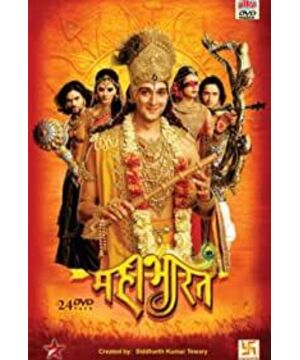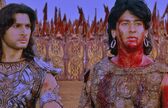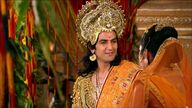Thanks to this TV series, and to the subtitles team, for allowing me to have such a wonderful and inspiring viewing experience. Although he has always loved history and philosophy, he has little knowledge of works outside of the two Greek civilizations. I have long admired ancient Indian philosophy and the epic masterpieces "Mahabharata" and "Ramayana", but I do not know how to enter. Again, thanks for this TV series, thanks to the subtitle team.
Maha's lines, especially in the opening episodes, are almost all philosophical and cautionary words. Second viewing, just for excerpts, now to episode 12.
(1)
Zhenxin: Only in struggle can we realize that we are still alive. Those who enjoy the world's pleasures cherish peace, and those who have nothing but peace pursue pleasure. After strife comes peace.
Zhenxin: The real power is not in the hands, but in the heart, desire is the power in the heart. God has given us such small eyes, and these eyes can see the vast expanse of the sky, how can I blaspheme the gods with my humble desires.
Krishna: Desires, hopes, visions, ambitions are the driving force behind the development of human society. It is desire that defines your life. Achievements that make a difference, failures that do nothing, describe who you are. Desire drives people around, like an oasis mirage that lures deer. But in the depths of this desire lies the light of wisdom. When the desire is not satisfied and fragmented, the light of wisdom will penetrate the gap and enter the hearts of people.
Zhenxin: The burning trees will still leave shadows on the ground. But that shadow is no longer available for people to enjoy the shade.
(3)
Bhishma: If a person is weak on the outside, he will be numb inside. The way such people get rid of their pain is to pass the pain on to others.
Amba: The righteous revenge is justice.
Bhishma: Whether your accusation is successful or not, someone should listen to it; the calm and objective testimony of the parties should also yield an answer. Only then can justice be served.
Axe Rama: Twenty-one times I have slaughtered the perfidious people in the world, beheading them all. And I finally realized that turning the pitcher upside down doesn't remove the vacuum. To eliminate the vacuum, it must be filled with water. Only by believing in justice can injustice be eliminated.
(6)
Axe Rama: Small stains are particularly conspicuous on white cloth; similarly, accusations against wise men are enough to sow seeds of doubt in society.
(7)
Maid: Everyone is afraid of the dark. We rely on our eyes to establish a connection with the world. As long as we can see, we seem to have everything; but in the dark, the human eye cannot see, and the whole world disappears from our eyes, so we are afraid of the dark.
(8)
Kṛṣṇa: Fear arises from the illusion of grief and has no connection with reality.
(9)
Kṛṣṇa: God may endow you with weaknesses, but the limits are only determined by personal perception.
(10)
Kṛṣṇa: One usually loves those who meet his expectations, which are doomed to fail. Why? Because expectations exist in the human mind, no one can fully understand the desires of another person's heart. Even if you are full of hope to meet all requirements, you will never be able to fully meet the expectations of the other party. That fundamentally sparked conflict. All human ties become conflict. When people stop basing their bonds on expectations and accept relationships as they are, life will be filled with peace and joy.
(11)
Gandhari: If happiness is not available, I should think about the definition of so-called happiness.
(12)
Gandhari: We can see the snake swimming on the ground, but we cannot understand how it swims. Our own experience is the biggest obstacle to understanding other beings.
Master of Mercy: An oath is always against tradition, and if it is in line with tradition, there is no need for an oath. But vows open up new horizons that will eventually become new traditions, so keeping promises is desirable.
Kṛṣṇa: When one is in a dilemma, one is anxious and indecisive, the decision becomes a struggle, and the mind becomes a battlefield. Decisions made at that time are mostly not for solving problems, but for finding inner peace. Can a man eat while running? cannot. So, can the fighting mind make the right decisions? In reality, decisions made with a stable mind can lead to a happy future. However, trying to achieve stability through decision-making will inevitably lead to suffering.
View more about Mahabharat reviews










